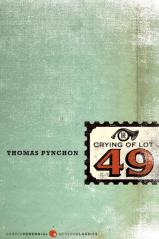There’s an ambitious scope to Jeffrey Eugenides’s Middlesex which pays off beautifully. The narration is epic and whimsical, the characters are vivid, and the focus is intensely broad. It occasionally falls into repetition, and its historical element can sometimes feel a bit like Forest Gump, but overall, it’s a unique, piercing read which tackles a subject not often dealt with.
The central premise of the novel is that its protagonist narrator, originally a girl named Calliope Stephanides, learns of her hermaphroditism as a teenager and switches her gender identity to male. There’s a lot of context behind this; the first half of the book traces the history of the Stephanides family from its days in Asia minor to its hot dog empire in the United States.
Hermaphroditism can be a hard subject to understand; as humans, liminal spaces can be bothersome. We like definitions. Hermaphrodites, because of their rarity and unique genital status, have always held an interesting position in the cultural imagination. The ancient Greeks often concerned themselves with the idea of that third sex possessing male and female anatomy. That’s why it’s appropriate, and not a little canny, that Cal comes from a Greek family.
Middlesex is an epic. Eugenides’s prose is lyrical and his themes are rooted in the Classics. The original Calliope was, of course, the muse of epic poetry. Fate is integral to the story, though it has a more modern character. The narrator constantly reminds us of a kind of genetic determinism; the Stephanides family possesses a recessive mutation which, when activated, births a girl who later turns out to be a boy. Cal constantly reminds us of the inevitability of this event. Everything that happens to her ancestors leads up to the point of her conception. The novel may not contain the kind of divine fate which plagued Oedipus and so many other tragic heroes, but there is this air of inescapability.
The book isn’t a tragedy because there’s never a serious attempt to escape fate. There is hubris, particularly in Callie’s conception; her parents timed their sex based on erroneous science, hoping to game the system and produce a girl. There’s a consequence in Cal’s suffering, though he eventually comes to terms with who and what he is.
Though Middlesex jumps around in time, its story begins in Asia minor, where the Stephanides family enjoys new freedoms after the British sponsored Greek invasion of Turkey. Cal’s grandparents, Lefty and Desdemona, are orphaned siblings who fall in love against the backdrop of the Turkish re-conquest. As the incestuous couple flees Turkey, they witness the burning of the ancient city of Smyrna, one of the novel’s two instances of urban chaos and destruction.
There’s an effective juxtaposition here between the individual struggle and the societal struggle. Thousands of Greeks run for their lives as a bloodthirsty army threatens everything they hold dear; racial tensions and ancient feuds collapse order. But amidst this, Lefty and Desdemona worry about their personal dilemma. They cover up their status as siblings; once they’re on the boat, they put on an elaborate show of pretending to meet as strangers and falling in love. Before they reach America, they get married.
As the years pass, ethnic tensions continue to boil over in different ways, effecting the central characters. After the focus shifts to the next generation, represented by Cal’s mother and father, Milton and Tessie, there’s an intense, devastating depiction of the 1967 Detroit race riots. There’s a rich irony in the effect the riots have on the Stephanides family; its fruition is too perfect to spoil in this review.
Identity is integral to the story. The Stephanides, upon first immigrating, are deeply Greek. Overtime, the family Americanizes. They’re still conditioned to some degree in their inherited values, but, starting with Milton’s generation, they move away from many of their ethnic traditions, adopting a more American mindset. The novel constantly reminds us of humanity’s fear of the other; how gender and racial divisions can fuel tension.
The novel, while not exactly upbeat, isn’t depressing – there’s beauty in resilience and survival. Lefty and Desdemona escape Turkey. Cal learns to accept and embrace his identity.
The latter portion of the story, which deals with Cal’s troubled adolescence, including a consuming infatuation with her female classmate, would seem out of tone with what came before if not for important thematic links. Eugenides concerns himself with collapsible boundaries. As a girl becomes a boy, a Greek becomes an American. Or, to adopt more liminal language: as a girl is a boy, a Greek is an American.
Eugenides handles Cal’s transition with sensitivity and insight. His awkward teenage years aren’t so far off from everyone else’s; we all struggle as we discover our sexuality and fall in love for the first time. But unlike most of us, Cal discovers something which seriously calls his identity into question. He changes and adopts new habits, yet somehow remains the same person. As the Stephanides family, despite Americanization, retains some of its Greek habits, Cal retains some of his feminine tendencies even as he attempts to compensate by wearing double breasted suits and smoking cigars.
The ornate, lyrical narration suits the story. It is, after all, an epic. The voice is entertaining and unique, but Eugenides does overdo it occasionally. He reminds us constantly of the recessive gene, which is important to the fatalistic concerns of the novel, but he does so too often. Repetition is important to the epic structure, but it is possible to go too far with it. Occasionally, when waxing poetic, Eugenides could’ve simply continued with the story.
Middlesex is an impressive, multifarious creation. Eugenides elegantly realizes his grand ambitions by writing a classical epic which tells the American story in an engaging way. Joyce said that, “In the particular is contained the universal.” I’m not a fan of Joyce, but I love that quote – it’s an accurate descriptor for Middlesex, which succeeds in telling the story of all of us despite the fact that its narrator has a rare and startling genetic condition.





